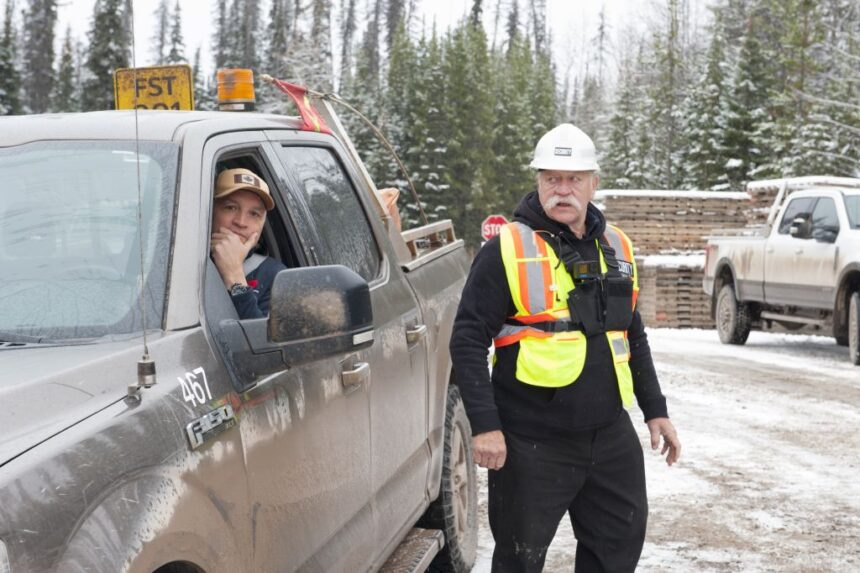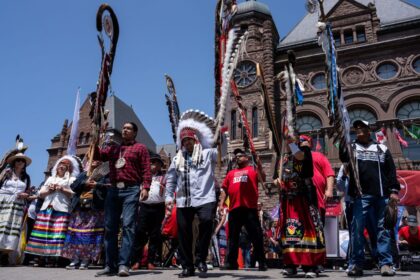The truck slowly pulled alongside as I idled at the side of a remote dirt road in northern B.C. No cell service, the nearest town half an hour away. I’d pulled off to let industrial traffic heading the other direction pass. It was 2022 and I was on my way to meet with Indigenous land defenders embroiled in a years-long fight against a major pipeline being built through Wet’suwet’en lands and waters without the permission of Hereditary Chiefs. The driver of the truck rolled down his window. “Need any help?” he said. I knew from markings on the truck that he worked for Forsythe, a private security company contracted by Calgary-based pipeline giant TC Energy. Security companies were hired to protect the construction of Coastal GasLink, a 670-kilometre natural gas pipeline. For years, Coastal GasLink had been a focal point for conflict, including dozens of arrests and extensive surveillance operations by private security and RCMP. What I didn’t know at the time was information about me, collected on behalf of the pipeline company, could have been shared with Canada’s national spy agency. Private security contractors, many of whom are former military or ex-RCMP, recorded media, land defenders and Indigenous leaders regularly during construction of TC Energy’s Coastal GasLink pipeline. Photos: Matt Simmons / The Narwhal The Narwhal and the Investigative Journalism Foundation recently reported TC Energy apparently leveraged a close relationship with former Canadian Security Intelligence Service (CSIS) director David Vigneault to expand information-sharing between CSIS and major Canadian companies. In 2024 emails to Vigneault, TC Energy said the proposed arrangement was necessary due to “security threats facing Canadian industry” which the company said included “acute risks from foreign adversaries,” according to documents obtained through freedom of information legislation. Vigneault left CSIS in 2024 and now works for an American intelligence company. This year, Canada passed legislation delivering many of TC Energy’s requests. Critics warn the flow of information could be going both ways — that companies like TC Energy could be feeding information to CSIS. They worry this could influence how and when the spy agency and federal law enforcement conduct surveillance of individuals and groups. It also means third-party security services like Forsythe, which employs ex-paramilitary soldiers and former RCMP officers, could be passing on information to CSIS and police about Indigenous and non-Indigenous land defenders and activists. Tia Dafnos, an associate professor of sociology at the University of New Brunswick, said the level of access gives industry an opportunity to shape a criminal justice narrative aligned with its interests. “One of the key concerns here is the lack of transparency and therefore accountability, when you have these discussions happening in spaces that are outside of public access,” she said. As the federal government pushes resource extraction in response to a barrage of economic sanctions from the current Trump administration, several major industrial developments — including an expansion of Coastal GasLink — could become new sources of conflict. Now, companies being scrutinized by environmental advocates and Indigenous land defenders have direct and secretive channels of communication to Canada’s spy agency. “When you have something deemed to be in the national interest, a threat to that national interest would move it into the realm of a national security issue,” Dafnos said. Protecting critical infrastructure can then become a justification to monitor and criminalize project opponents, she explained. CSIS did not respond to detailed questions prior to publication. Formal and informal relationships between industry executives and senior CSIS officials offer the private sector an avenue for “framing a threat or influencing the perception of threat,” Dafnos said. The secretive nature of those relationships also risks criminalizing or intimidating journalists. Back in 2022, I told the security guard I didn’t need his help and rolled up my window. After the heavy trucks rumbled past, I drove on. He followed. For more than 20 kilometres, winding through deep forest beside the Wedzin Kwa (Morice River), the truck stayed close behind, a spectre in my rear view mirror. At my destination, I parked and got out, shouldering my camera and grabbing my notebook. I could see him in his truck watching my movements from a distance. I turned and went inside the land defenders’ compound. A tall fence around the Gidimt’en checkpoint was built to shield land defenders from the near-constant surveillance of private security contractors. Photo: Matt Simmons / The Narwhal What goes on in ‘private, high-level’ discussions between TC Energy and CSIS? No one knows The documents obtained by The Narwhal and the Investigative Journalism Foundation this fall detail email communications between TC Energy executives, the Business Council of Canada, which represents the country’s wealthiest companies, and Vigneault, who signalled his support for the industry-led initiative. It was a paper trail that confirmed what was discussed in internal company calls leaked to the media in mid-2024. On those calls, detailed by The Narwhal in a series of investigative reports, former staffers from the first Trump administration — including foreign service operatives and ex-military hackers — talked about the extensive intelligence-gathering operations they conducted on behalf of the pipeline company. They also said TC Energy executives were attempting to persuade CSIS to share information with corporations more freely. Those efforts were ultimately successful. Keith Stewart, a senior energy strategist with Greenpeace Canada, warned the powers given to CSIS are “ripe for further abuse.” “This intelligence sharing blurs the line between public security and corporate interests and risks putting Indigenous land defenders and climate activists under increasingly invasive surveillance for peacefully opposing fossil fuel expansion,” he said in a statement. Secrecy is intrinsically part of CSIS operations, which means much of what goes on in its meetings with corporations like TC Energy remains unknown. Unlike lobbying activities, which give the public a glimpse into how and when fossil fuel companies and other private sector entities interact with government officials, the “private, high-level discussions” requested by TC Energy remain a black box. As Dafnos put it, an absence of any details about what kind of information is being shared means the public doesn’t know whether or not it should be concerned. “It’s kind of a conundrum,” she said, adding it’s also likely information is being shared in less formal ways. As The Narwhal and the Investigative Journalism Foundation reported, Business Council of Canada president Goldy Hyder called Vigneault a “dear friend” and said he texts him regularly. “Are they sharing information about threats, like political opposition or grassroots opposition to energy projects?” Dafnos asked. “How do we get access to the phone calls that people are making to each other?” ‘Our democratic right’ Nikki Skuce has first-hand experience with her environmental activism attracting the attention of the federal spy agency. While working for environmental advocacy group ForestEthics in the early 2010s, she found herself unexpectedly entangled with CSIS. At the time, she was involved in organizing opposition to the Northern Gateway pipeline, an Enbridge proposal to transport bitumen from the Alberta oilsands to marine shipping routes on the northwest coast. Skuce said opposition to Northern Gateway drew the ire of former minister of natural resources Joe Oliver. In 2012, Oliver accused those who opposed projects like the pipeline of having a “radical ideological agenda.” He alleged they were trying to “exploit any loophole they can find, stacking public hearings with bodies to ensure that delays kill good projects.” Others took it a step further, labelling Skuce and her peers as “eco-terrorists” or “extremists” after then-prime minister Stephen Harper and his cabinet lumped environmental advocates in with white supremacists and anti-capitalists in a controversial anti-terrorism bill. “It was frightening, frankly,” she said. She told The Narwhal she first became aware she was being spied on after a small community meeting on Nadleh Whut’en territory, about 150 kilometres west of Prince George, B.C. “It wasn’t a meeting that stood out or anything,” she said, explaining the point was for attendees to come together in solidarity and strategize opportunities for outreach. Nikki Skuce, who worked for ForestEthics on campaigns opposed to the Northern Gateway oil pipeline, said finding out she was being watched by Canada’s spy agency was ‘frightening.’ Photo: Marty Clemens / The Narwhal After the surveillance operation came to light, when records were unearthed in 2013, land defenders and environmental organizations in B.C. feared they were under constant surveillance and some felt they could no longer safely voice dissent over Northern Gateway. “It was rattling and just a feeling in the pit of your stomach, like, what has become of this country, what’s become of Canada, that they’re spying on activists?” Skuce said. Skuce and others targeted in the surveillance operation later testified as part of a case brought forward by the BC Civil Liberties Association, which alleged CSIS had illegally spied on citizens, groups and First Nations, and was sharing that information with fossil fuel companies. At the time, they were subject to a “gag order” prohibiting witnesses from talking about their testimonies, even to each other, Skuce said. Eventually, after lawyers with the civil liberties group fought in the courts for five years, the so-called “protest papers” were released, though heavily redacted, and the gag order was lifted. In 2024, the federal courts denied an application to release all the documents unredacted. The civil liberties association appealed that decision. “It was just shocking and kind of hard to believe,” Skuce said. “Since then, I think it’s gotten worse, seeing how things played out here in Wet’suwet’en territory with Coastal GasLink and the level of oppression and the weaponizing and use of injunctions.” She said it feels like an erosion of democracy, where dissent is directly targeted and dissuaded, if not criminalized. “It’s just depressing, really.” “Legitimate protest and activism is our democratic right here in Canada and I think everyone should be concerned if we’re having our police force and spy agencies sharing that information with corporations,” she said. — With files from Zak Vescera Recent Posts B.C.’s century-long feast on big, old trees has sent forests into freefall Nov. 12, 2025 7 min. read A close look at the province’s old-growth data reveals a gap between political promises and… The day pipeline security followed me — and what I learned later about Canada’s spy agency By Matt Simmons (Local Journalism Initiative Reporter) Nov. 12, 2025 8 min. read As the federal government designates resource extraction projects in the ‘national interest,’ the companies building… Who’s afraid of the big, bad coywolf? Nov. 10, 2025 13 min. read Reports of a larger, more aggressive coyote wandering Toronto streets understandably draw attention, but behind…
The day pipeline security followed me and what I learned later about Canadas spy agency











